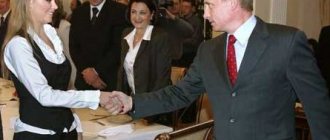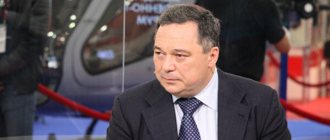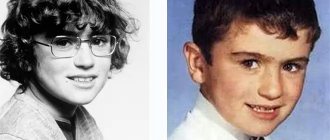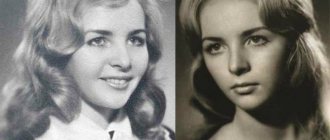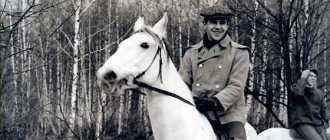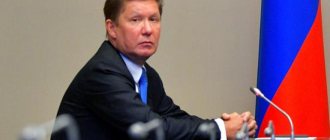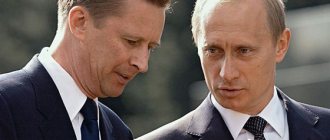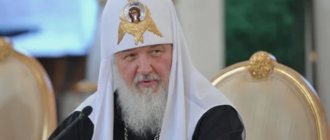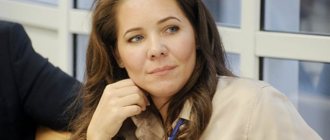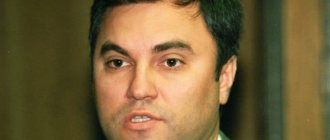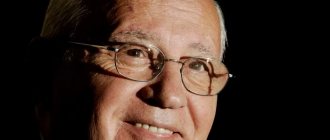Putin Vladimir Vladimirovich
President of Russian Federation. Supreme Commander-in-Chief of the Russian Armed Forces. One of the most influential people in the world. In fact, he has been the leader of the Russian State for more than 20 years. In the past, he served for a long time in the State Security Committee of the USSR. Reserve Colonel. Candidate of Economic Sciences. Master of Sports in Sambo and Judo.
Vladimir Putin was born on October 7, 1952 in the city of St. Petersburg. From 1960 to 1968 he studied at eight-year school No. 193 in his hometown. After which he entered special school No. 281 with a chemical focus at the Institute of Technology. Since childhood, he was fond of the martial arts of sambo and judo, and achieved high results, later becoming a master of sports.
In 1970, Vladimir Putin entered the law faculty of St. Petersburg State University. Having received his diploma in 1975, he was assigned to the KGB of the USSR. From 1985, he worked for five years in the German city of Dresden.
After returning to St. Petersburg in June 1990, Putin became assistant to the vice-rector of his native university for international affairs. In the same year, he began his political career under the leadership of the chairman of the St. Petersburg City Council Anatoly Sobchak: receiving the post of adviser on international relations. In June 1991, after Sobchak was elected mayor of St. Petersburg, Vladimir Vladimirovich was appointed chairman of the Mayor's Committee on External Relations.
During the August 1991 coup, he retired with the rank of lieutenant colonel. In 1994, Putin became first deputy prime minister of St. Petersburg. In 1995, he headed the regional branch of the “Our Home is Russia” bloc in the parliamentary elections. The following year he participated in Sobchak's election campaign. After Sobchak's defeat, he resigned from his posts in the government of St. Petersburg.
In 1996, Vladimir Putin moved to Moscow. He worked in the presidential administration of Boris Yeltsin. Since August 1996, he was deputy manager of the affairs of the President of the Russian Federation Pavel Borodin. On March 25, 1997, Putin became deputy head of the presidential administration and head of the Main Control Directorate. Further, on May 25, 1998, he was appointed First Deputy Head of the Administration, responsible for regional policy.
At the end of July 1998, Vladimir Putin headed the Federal Security Service of Russia. In October 1998, he was introduced to the Russian Security Council as a permanent member, and from March to August 1999 he served as secretary of this structure.
Putin on August 9, 1999, was appointed acting Chairman of the Government of the Russian Federation. The State Duma on August 16, 1999 approved his appointment as Prime Minister. During his time at the head of the government, he paid special attention to the attack of Chechen militants on Dagestan, and after the explosions in Moscow and Volgodonsk, he began the second Chechen campaign.
At 12 noon Moscow time on December 31, 1999, Boris Yeltsin officially announced his resignation as President of the Russian Federation. The message was repeated on major television channels a few minutes before midnight. Prime Minister Vladimir Putin was appointed acting president of Russia, and immediately after Yeltsin’s statement, he addressed the citizens of the Russian Federation with a New Year’s address. On the same day, Putin signed a decree guaranteeing Yeltsin protection from prosecution and material benefits for him and his family.
On March 26, 2000, Vladimir Putin won a landslide victory in the first round of elections for the President of the Russian Federation. During his first presidential term, he carried out a reform of the country's federal structure; made noticeable personnel changes in the highest echelons of power. He also entered into confrontation with the so-called oligarchs: Berezovsky, Gusinsky, Khodorkovsky. He made a strategic turn in Russian foreign policy, choosing a course towards rapprochement with the West: he supported the United States after the September 2001 terrorist attacks and managed not to spoil relations with Washington after the start of the war in Iraq in 2003.
Further, on March 14, 2004, Vladimir Vladimirovich Putin was re-elected to the post of President of Russia, receiving 71% of the votes in the elections. Shortly before the elections, the cabinet of ministers Mikhail Kasyanov resigned, who was replaced by Mikhail Fradkov. Vladimir Putin’s second presidential term is dedicated to further strengthening the “vertical of power”—the concentration of powers in the hands of the Kremlin. An additional impetus to this process, announced by Putin during his first presidential term, was given by a series of major terrorist attacks that occurred in 2004: the February explosion in the Moscow metro at the Avtozavodskaya station; explosion at the stadium in Grozny on May 9, which killed Chechen President Akhmad Kadyrov; June militant attacks on the Ingush cities of Nazran and Karabulak; explosions of two planes taking off from Domodedovo airport, as well as an explosion near the Rizhskaya metro station in Moscow, which occurred in August; and, finally, the seizure by militants in September of a school in the North Ossetian city of Beslan, where more than three hundred people died.
All these events prompted Putin to announce the abandonment of direct elections of heads of federal subjects: from now on they should be appointed by the president with subsequent approval in local legislative assemblies. In addition, the president intensified the state offensive against independent media, oligarchs, and regional authorities.
In the field of foreign policy, Putin’s second term is characterized by a decisive cooling of relations with the CIS countries, where the “color revolutions” took place, as well as with Western countries, primarily with the United States. In 2007, there was a tendency for Putin to tighten his foreign policy rhetoric towards the West: in particular, he sharply opposed plans for NATO expansion and the deployment of American missile defense facilities in Eastern Europe.
In 2008, Putin's second presidential term was to end, after which, in accordance with the constitution, he had to leave his post. Possible candidates for the post of “successor” to the president were widely discussed in the press. The main contenders are considered to be the first deputy prime ministers of the government: Sergei Ivanov and Dmitry Medvedev. When Fradkov’s cabinet resigned on September 12, 2007, it was Ivanov who was called the most likely new prime minister, but Putin made the head of the government, the head of the Federal Service for Financial Monitoring, Viktor Zubkov.
On October 1 of the previous year, Vladimir Putin agreed to head the list of the United Russia party in the upcoming Duma elections and did not rule out that in 2008 he could become the head of the Russian Government. The party, according to the results of the elections held on December 2, 2008, received the support of 64.30% of voters and 315 seats in the new Duma. Further, on December 10 of the same year, the question of Putin’s successor was resolved: the President approved the candidacy of Dmitry Medvedev proposed by the leadership of four parties, who, in turn, promised to appoint Putin as Prime Minister of Russia if he won.
In the presidential elections held on March 2, 2008, Dmitry Anatolyevich Medvedev received more than 70% of the votes. Soon, on May 7, 2008, Vladimir Vladimirovich resigned as president, simultaneously becoming chairman of the United Russia party. The next day, May 8, 2008, after the approval of Vladimir Putin’s candidacy by deputies of the State Duma, Dmitry Medvedev signed a decree appointing Vladimir Vladimirovich to the post of Prime Minister. Later, on May 27, 2008, Putin took over the post of Chairman of the Council of Ministers of the Union State of Belarus and Russia.
Putin called the entry of Georgian troops into the territory of the unrecognized republic of South Ossetia and the shelling of its capital, Tskhinvali, in August 2008 aggression against South Ossetia, and described the actions of the Georgian army on the territory of the republic as “complete genocide.” Vladimir Putin proposed documenting the crimes committed against the civilian population of the republic and allocating about 10 billion rubles for the restoration of South Ossetia and 500 million rubles to help victims of the humanitarian disaster.
After the global financial crisis began in the fall of 2008, Putin promised to deal with the situation and blamed it on the US government. He also announced that the government had developed a new set of measures to overcome the crisis: for the first time, a possible reduction in budget expenditures and state monopolies was announced.
In September 2011, Putin accepted Dmitry Medvedev's proposal and agreed to stand as a candidate in the 2012 presidential elections. The elections held on March 4, 2012 ended with Putin’s victory in the first round: according to the Central Election Commission, 63.60% of voters voted for him. The presidential inauguration took place on May 7, 2012. The next day, he appointed Medvedev as the new Prime Minister of the Russian government.
Also on the day he took office, the President signed 11 decrees designed to solve the most significant and sensitive problems for citizens, namely: increasing the salaries of public sector employees while simultaneously improving the quality of medical, educational and social services; improving living conditions, including for large families and those living in dilapidated buildings; improving the work of authorities and organizations providing municipal and government services.
Constant monitoring of the implementation of instructions formulated within the framework of the May decrees was carried out by the Commission for Monitoring the Achievement of Target Indicators of Socio-Economic Development of Russia, headed by the President.
On February 7, 2014, Vladimir Putin launched the XXII Winter Olympic Games in Sochi. To hold them, 11 sports facilities with a total capacity of 200 thousand spectator seats were built in the city. In total, 380 structures were erected during the preparation process: coastal and mountain cluster facilities, transport, energy and hotel infrastructure. 2,876 athletes from 88 countries took part in the Games in Sochi. This was the first Winter Olympics in Russian history.
In Crimea, on March 16, 2014, a referendum was held in which 96 percent of voters were in favor of reunification with Russia. On March 18, in the St. George Hall of the Kremlin, the President addressed both chambers of the Federal Assembly with a request to consider the Constitutional Law on the admission of two new entities to the Russian Federation: the Republic of Crimea and the city of Sevastopol. The agreement on the annexation of Crimea to Russia was signed immediately after the speech was made.
The third term as a whole was a difficult period. It occurred during difficult historical events. Putin's firm position on the Ukrainian crisis and military operations in Syria - all this, despite criticism, had a beneficial effect on his rating.
In the next presidential elections of the Russian Federation, held on March 18, 2021, the current head of state, Vladimir Putin, won by a huge margin. According to the CEC, he received 76.66% of the votes. The second was the candidate from the Communist Party of the Russian Federation Pavel Grudinin, who received 11.8% of the votes. The leader of the LDPR party, Vladimir Zhirinovsky, received 5.66% of the votes.
The day after officially taking office, the candidacy of Dmitry Medvedev was submitted to the State Duma for approval as Prime Minister of Russia. On this day, after Medvedev was confirmed in office, Putin invited him to form a new government. Decrees on the composition of the new government were signed on May 18
In the summer of 2021, the XXI FIFA World Cup was held in Russia. In December 2010, after the victory of the Russian bid to host the 2021 FIFA World Cup, Putin, then still in the rank of prime minister, personally flew to Zurich to thank members of the FIFA executive committee for the trust they placed in Russia. Many world experts recognized that the organization of the event was carried out at the highest level.
Not all of Vladimir Vladimirovich’s actions are perceived optimistically by the people. The 2021 pension reform caused a particularly negative reaction. The most massive protests against the reform took place from July to September 2021. During the protests, there were calls for the resignation of the government and the president who initiated the pension reform. On September 27, the bill was adopted by the State Duma, on October 3 by the Federation Council, and on the same day it was signed by the president of the country.
In his next address to the Federal Assembly on January 15, 2020, Putin proposed making large-scale amendments to the Constitution of the Russian Federation and announced a set of socio-economic measures designed to improve the well-being of Russian residents and help solve demographic problems. Immediately after the president's speech, the government resigned. On January 16, 2021, the government was headed by the head of the Federal Tax Service of the Russian Federation, Mikhail Mishustin.
During the period from June 25 to July 1, 2021, a vote was held in Russia to amend the Constitution, as a result of which the amendments proposed by the government were adopted.
In the same year, the COVID-19 pandemic had a significant impact on the socio-economic situation in Russia, as well as in the rest of the world. On April 7, the number of newly identified cases of the disease in Russia per day exceeded a thousand people for the first time; by September 1, the number of people infected since the beginning of the pandemic exceeded 1 million. On August 11, Putin announced the registration in Russia of the world’s first vaccine against coronavirus infection. In September, a large-scale voluntary vaccination campaign began in Russia.
The pandemic has caused the economy to collapse, as in most other countries. Unemployment increased significantly, inflation increased, and GDP declined. In general, according to Putin himself, the crisis in Russia has not become systemic thanks to timely anti-crisis measures taken to support the population and business.
The personal life of Vladimir Putin has been stable and successful for a long time. On July 28, 1983, 30-year-old Putin married 25-year-old Lyudmila Aleksandrovna Shkrebneva. For thirty years, his wife was always by his side and supported him in everything, but in 2013, in an interview with the Rossiya-24 TV channel, Vladimir and Lyudmila Putin announced that their marriage was actually completed by mutual decision. The official divorce was finalized in 2014.
The marriage produced two daughters: Maria, born in 1985, and Katerina, who was born a year later. Both studied at St. Petersburg State University. Maria is at the Faculty of Biology and Soil Science, and Katerina is at the Eastern Faculty. The privacy of Putin’s daughters is carefully protected; there was a version that they were enrolled in the university, not under their own names. The head of state has already become a grandfather twice, but the names of his grandchildren are also kept secret.
Vladimir Vladimirovich enjoys skiing. In 2011, he mastered skating and started playing hockey.
The politician devotes a lot of time to reading. Since childhood, he loved the works of Rudyard Kipling, and in adulthood he began to give preference to the works of Mikhail Lermontov. One of Putin’s favorite songs is “Where the Motherland Begins,” a melody the president often sings and plays on the piano. Favorite musical group is the Lyube group. Vladimir Vladimirovich is also a fan of the operatic work of Dmitry Hvorostovsky, the Swedish musical quartet ABBA, he enjoys listening to Grigory Leps’ chanson, gypsy music and songs, and the ensemble “Gypsy Court” has performed at Putin’s personal celebrations more than once.
The head of state collects geographical maps and postage stamps with images of prominent people. Loves fishing and spearfishing.
Fluent in German, can speak English. According to Willi Wimmer, former vice-chairman of the OSCE Parliamentary Assembly, what sets Vladimir Putin apart from other politicians is his ability to accurately and confidently translate spontaneous German speech in front of an audience.
Awards and titles of Vladimir Putin
Awards and titles of Vladimir Putin
Soviet
Order of the Badge of Honor (1988)
Russian
Order of Honor (March 12, 1996) - for services to the state and great contribution to the arrangement of the customs border with the Baltic states
Personalized naval broadsword from the commander of the Russian Black Sea Fleet, Admiral Vladimir Komoyedov, and the commander of the Ukrainian Naval Forces, Mikhail Yezhel (2000)
Order of Merit for the Republic of Dagestan (September 13, 2014)
Foreign
Bronze Medal of Merit of the National People's Army of the GDR (Bronzene Verdienstmedaille der Nationalen Volksarmee; 1988) Order of Ho Chi Minh (Huân chương Hồ Chí Minh; 2001, Vietnam) Gold Medal of the Greek Parliament (2001) Order of “Altyn Kyran” (Altyn Kyran Order) ; 2004, Kazakhstan) Grand Cross of the Legion of Honor (Grand-croix de la Légion d'honneur; 2006, France) Gold medals of the Senate and Congress of the Cortes General (2006, Spain) Order of King Abdulaziz (2007, Saudi Arabia) Order of Ismoili Somoni first degree (2007, Tajikistan) Order of Zayed (2007, UAE) Order “Buyuk xizmatlari uchun” (2008, Uzbekistan) Saxon “Order of Gratitude” (German “Dankesorden”, January 16, 2009, Saxony) Order Precious staff with pearls (Mongolian “Erdeniin Ochir”, 2009, Mongolia) Grand chain of the Order of the Liberator (April 2, 2010, Venezuela) Distinction “Personalized firearms” (October 27, 2010, Ukraine) Grand chain of the Order of the Republic of Serbia (February 25 2013, awarded on October 16, 2014 Order of Friendship of Peoples (March 15, 2013, Belarus) Grand Cross of the Order of St. Charles (October 4, 2013, Monaco) Order of “José Martí” (July 11, 2014, Cuba) Commemorative medal in honor of the 75th anniversary of the victory at Khalkhin Gol (September 3, 2014, Mongolia) Grand Cross of the National Order of Merit (September 28, 2021, Guinea). Order “For Contribution to the Development of Cooperation” (October 2, 2017, Turkmenistan). Order of Manas, 1st degree (November 22, 2021, Kyrgyzstan). Order of Friendship (June 8, 2021, China) Order of Uatsamonga (August 24, 2021, South Ossetia) Order of Honor and Glory, 1st class (August 24, 2021, Abkhazia)
Departmental
Medals “For Impeccable Service” of the KGB of the USSR II and III degrees Commemorative medal “Participant of the forced march on June 12, 1999 Bosnia-Kosovo” made of silver (Ministry of Defense of Russia, 2000) Commemorative medal of A. M. Gorchakov (Ministry of Foreign Affairs of Russia, 2001)
Religious
Speech at the presentation of the highest Azerbaijani Muslim order “Sheikh-ul-Islam”. Order of the Holy Equal-to-the-Apostles Grand Duke Vladimir, 1st degree (2002, Russian Orthodox Church) Order of “Holy Tsar Boris” (2003, Bulgarian Orthodox Church) Order of “Sheikh ul-Islam” (2006, Spiritual Administration of Muslims of the Caucasus) Order of “Glory and Honor” (2007, Russian Orthodox Church) Order of St. Sergius of Radonezh, 1st degree (ROC) Order of St. Sava, 1st degree (2011, SOC)
Public
Honorary Badge of the Commonwealth of Independent States (October 7, 2002) - for outstanding contribution to the strengthening and development of the Commonwealth of Independent States, friendship, good neighborliness, mutual understanding and mutually beneficial cooperation between member states of the Commonwealth of Independent States Medal "Salvation" (2005, Federation of Jewish Communities of Russia) Commemorative Medal of the Commonwealth of Independent States (February 22, 2008) - for great personal contribution to strengthening cooperation and friendship between the states and peoples of the Commonwealth of Independent States, mutual understanding and trust between the leaders of the CIS member states Medal "Russian-Kyrgyz Friendship" (2011, Coordination Council of the Russian unifying union of compatriots (ROSS) in Kyrgyzstan) Medal “For the liberation of Crimea and Sevastopol” (March 17, 2014) - for personal contribution to the return of Crimea to Russia
Academic
Russian
Honorary Member of the Russian Academy of Arts Honorary Doctor of the Russian Military Medical Academy (since 2000) Honorary Doctor, Member of the Academic Council of the Law Faculty of St. Petersburg University (since 2000) Honorary Professor of the St. Petersburg Humanitarian University of Trade Unions
Foreign
The ceremony of presenting Vladimir Putin with the robe of an honorary doctor of the Baku Slavic University. Honorary Doctor of the University. J. Nehru (since 2000, India) Honorary Doctor of Law of the Turkmen State University (since 2000) Honorary Doctor of the University of Athens (2001, Greece) Honorary Doctor of the Yerevan State University (2001, Armenia) Honorary Doctor of the Baku Slavic University, Azerbaijan Honorary Doctor of Belgrade University (since 2011, Serbia)[Honorary Doctor of the University of the Peloponnese[en] (since 2021, Greece)
Sports
“Leader of the World” - the title was awarded in 2001 on the initiative of the World Grand Masters Club (USA) together with the FRBI. It was awarded for the first time since the founding of the Grand Masters Club. Frank Sanchez was also awarded an honorary 10th dan and a red belt for preserving and developing the national martial art in Russia - RBI Master of Sports of the USSR in judo and sambo Honored trainer of Russia in sambo (title awarded 06/05/1998) Winner of 5- Go Dana Kekusinkai (degree is assigned on 04/29/2001 Hatsuo Royama), presentation of the 7th Dana Kekusinkai (version of Kekusinkan) 12/13/2009 also Hatsuo Royama, the owner of the 8th was given by Kekusinkai (version of Kekusinkan; degree was assigned to the president of the international organization Karatedo Kekusin -kan Hatsuo Royama) Holder of the 8th dan of judo of the International Judo Federation (degree awarded on 10/10/2012 by the President of the International Judo Federation Marius Wieser in connection with the 60th anniversary of Putin) Holder of the 9th dan of goju-ryu (degree awarded on 07/22/2010 in Okinawa Chairman of the All Japan Karate Federation and head of the Goju-ryu karate school Katsuyuki Fukatoshi) Order of the International Swimming Federation (FINA) (October 11, 2014)
Awards
2001 - laureate of the Peter the Great National Prize 2002 - laureate of the prize “For outstanding activity in strengthening the unity of Orthodox peoples” 2002 - laureate of the Moscow Union of Journalists prize “For openness to the press” with the wording “For a sincere desire to convey to every Russian the reforms carried out by the state” Prize laureate magazine "Ogonyok" 2004 - laureate of the "Person of the Year 2004" award in the category "State and Political Activities" "for strengthening Russian statehood" 2004 - laureate of the Andrei Pervozvanny Award "For Faith and Loyalty" December 19, 2007 - declared Person of the Year by Time magazine -2007 September 3, 2008 - first place in the ranking of “The Most Influential People in the World” - according to Vanity Fair July 9, 2011 - became a laureate of the prestigious German political award “Quadriga”, but on July 16 of the same year the Organizing Committee reversed its decision to award the award. The reason for the withdrawal of the award was criticism from both a number of members of the organizing committee and the media 2011 - V. Putin was awarded the Chinese Confucius Peace Prize November 4, 2013 - Prize of the World Russian People's Council November 27, 2013 - the title "Person of the Year 2013" ( Russian Biographical Institute) - for strengthening Russia's position in the international arena and exceptional contribution to the resolution of the Syrian conflict. Toponyms Former Victory Avenue in the city of Grozny in 2008 was renamed Vladimir Putin Avenue. In June 2012, before Putin’s official visit to Palestine, a street was named in his honor, on which the Russian Center for Science and Culture was opened at the same time, and since 2013 the cultural and business center of Russia has also been built. Pond in the Moscow region. Military rank and class rank Reserve Colonel (1999) Active State Councilor of the Russian Federation, 1st class (April 3, 1997).
Filmography of Vladimir Putin
Filmography of Vladimir Putin
Filmography
2015 - “President” - Russian full-length documentary film by Vladimir Solovyov; 2015 — “Crimea. The Path to the Motherland" is a Russian full-length documentary film by Andrei Kondrashov; 2015 - “World Order” - Russian full-length documentary film by Vladimir Solovyov; 2021 - “Ukraine on Fire” - American full-length documentary film by Igor Lopatenok; 2021 - “Interview with Putin” - American four-part documentary film by Oliver Stone; 2021 - “Big, beloved, dear” - Russian short feature film from the children’s film studio “Tenth Muse”; 2021 - “Valaam” - Russian documentary film by Andrei Kondrashov; 2021 - “World Order 2018” - Russian full-length documentary film by Vladimir Solovyov; 2021 - “Putin” - Russian full-length film by Andrei Kondrashov; 2021 - “The Sobchak Case” - Russian documentary film by Vera Krichevskaya.
Vladimir Putin's family
Vladimir Putin's family
Father - Vladimir Spiridonovich Putin (02/23/1911 - 08/02/1999), before the war (from 1933 to 1934) he served in the submarine fleet, a participant in the Great Patriotic War, called up by the Peterhof RVK of the Leningrad region. In the Red Army - from June 1941, a soldier of the 330th Infantry Regiment of the 86th Division of the Red Army, defending the Nevsky Patch, was seriously wounded by shrapnel in the left shin and foot on November 17, 1941. Awarded medals: “For Military Merit”, “For the Defense of Leningrad”, “For Victory over Germany”. Member of the CPSU(b) since 1941. After the war - a foreman at the plant named after. Egorova. In 1985 he was awarded the Order of the Patriotic War, 1st degree.
Mother - Maria Ivanovna Putina (née Shelomova) (10/17/1911 - 07/06/1998), also worked at the plant, survived the siege of Leningrad. Awarded by the KBF headquarters.
Grandfather - Spiridon Ivanovich Putin (12/19/1879-03/8/1965), at the age of 12 he was sent to “cook training” in the Tver tavern, proved himself, ended up in a St. Petersburg restaurant, married fellow villager Olga Ivanovna Chursanova, worked as a culinary specialist in “Astoria” on Gorokhovaya Street, where Grigory Rasputin went (according to legend, he once ordered the cook to be called, praised him and asked his name, and when he learned that it was Putin, he exclaimed: “Almost namesakes!” and put a gold coin in the cook’s hand). In the First World War he was sent to the front. After the revolution, fleeing urban famine, he moved with his family to Pominovo; then moved to Moscow. He worked as a cook in Gorki, cooking for Nadezhda Krupskaya, Maria and Dmitry Ulyanov until their deaths. In 1940, he became the senior cook of the boarding house of the Moscow City Party Committee "Ilyichevsky" in the village of Ilyinsky. There he fed the Minister of Culture Ekaterina Furtseva, the first secretaries of the Moscow Civil Code Viktor Grishin and Ivan Kapitonov, Nikita Khrushchev and his mother, and worked until he was eighty years old.
Grandmother - Olga Ivanovna Putina (village Chursanova)
On July 28, 1983, 30-year-old Putin married 25-year-old Lyudmila Aleksandrovna Shkrebneva.
On June 6, 2013, Vladimir and Lyudmila Putin announced that their marriage was actually completed by mutual decision.
Children and grandchildren
The marriage produced two daughters: Maria (born on April 28, 1985 in Leningrad) and Katerina (born on August 31, 1986 in Dresden) - they studied at St. Petersburg State University (entered in 2003) - Maria in the biology and soil department, Katerina in the oriental faculty. The privacy of Putin's daughters is carefully guarded.
According to published data, on August 15, 2012, Maria gave birth to a son in Moscow. The fact of the birth of Putin’s grandson was confirmed in 2014 by his longtime friend, musician Sergei Roldugin. Finally, in June 2017, Putin confirmed in an interview with Oliver Stone for his documentary “The Putin Interviews” that he has grandchildren. During the Direct Line on June 15, 2021, Vladimir Putin said that his second grandson was recently born.
Goddaughter - Daria Viktorovna Medvedchuk (2004), daughter of Ukrainian politician Viktor Medvedchuk.
14.04.2021
Where was Putin born and who are his parents?
The president's father, Vladimir Spiridonovich, was born in 1911. From Pominovo he went to do military service in the navy as a submariner, and upon returning to Pominovo he got married and moved with his wife to St. Petersburg. A number of political scientists and those simply interested have questions about who Putin’s parents are by nationality. But there is no doubt - Vladimir and Maria, their ancestors are Russian.
The Russian leader's maternal ancestors bore the surname Shelomov. Maria Ivanovna, the mother of the current Commander-in-Chief of the Russian Federation, was born in the same year as her husband - in 1911. After their marriage, Vladimir and Maria had their first child, Albert, but he died before the Great Patriotic War.
The couple, having moved to St. Petersburg, survived the blockade, during which they lost their second son, Victor, due to rampant diphtheria. During the war years, Vladimir Spiridonovich went to the front, where he participated in the defense of the Nevsky Patch and was seriously wounded.
